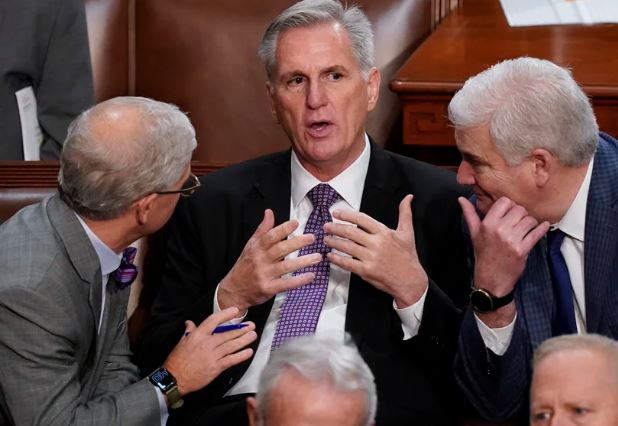It was the first time in 100 years that a candidate for the presidency of the House of Representatives failed to take office on the first ballot.
For the second day on Wednesday, the leader of the Republican legislators, Kevin McCarthy, failed again in his attempt to be elected as speaker of the United States House of Representatives, after a sixth round of voting.
Thus the second day of sessions of the new Congress passed, without the end of the political chaos that the conservatives of the Republican Party have created.
For the fifth time, Republicans nominated McCarthy as their president as the House descended further into chaos. That came moments after the fourth ballot showed 20 reluctant Conservatives still refusing to support him, unchanged from last time. He fell short of the 218 votes normally needed to win the deck.
A nucleus of about 20 congressmen from the most conservative wing blocked his election in the chamber. This small but intransigent group wants to take advantage of the fact that the party only has a slim majority after the mid-term elections in November to impose its conditions.
McCarthy fared no better than in the previous day’s voting, as 20 of his conservative colleagues also denied him his vote. It seems that on Wednesday they had not changed their mind.
The California Republican, however, vowed to continue fighting despite losing the voting rounds that also caused a stir the day before among Republicans, who make up the new legislative majority.
The dynamic was not different from Tuesday, the first day of sessions. The Democrats nominated their leader, Rep. Hakeem Jeffries, as Speaker of the House. A right-wing leader of the group known as the Freedom Caucus offered McCarthy an option by nominating Rep. Byron Donalds, R-Fla. It was another historic moment, as both Jeffries and Donalds are black.
“This country needs leadership,” said Rep. Chip Roy, Republican of Texas, who stressed that it was the first time in history that two black Americans had been nominated for the position. Lawmakers from both parties rose to their feet to applaud.
It was the first time in 100 years that a House candidate had failed to win office on the first ballot, but McCarthy seemed unfazed. Instead, he vowed to fight to the end encouraged — he said — by former President Donald Trump to end the disorder and unite the Republican Party.
Since 1923, the choice of a speaker has not gone through multiple ballots, and the longest and most grueling fight for the gavel began in late 1855 and lasted for two months, with 133 ballots, during the slavery debates in the period prior to the Civil War.
“Kevin McCarthy is not going to be a speaker,” said Rep. Bob Good, R-Va., one of the resisters.
A new generation of conservative Republicans, many aligned with Trump’s Make America Great Again agenda, want to change business as usual in Washington and have vowed to stop McCarthy’s rise without compromising his priorities.
As the voting spectacle dragged on, McCarthy supporters implored the holdouts to side with the California Republican.
“We all came here to get things done,” second-ranking Republican Rep. Steve Scalise said in a speech in which he nominated McCarthy for the vote and urged his colleagues to drop their protest.
Criticizing Democratic President Joe Biden’s agenda, Scalise, himself a potential GOP compromise option, said: “We can’t start fixing those problems until we pick Kevin McCarthy as our next speaker.”
The standoff over McCarthy has been building since Republicans won a majority in the House of Representatives in the midterm elections. While the Senate remains in Democratic hands, House Republicans are eager to take on Biden after two years of Democrats controlling both houses of Congress. The conservative Freedom Caucus led the opposition to McCarthy, believing that he is neither conservative enough nor tough enough to fight the Democrats.
To win support, McCarthy has already conceded to many of the demands of the Freedom Caucus, which has been calling for rule changes and other concessions that give rank-and-file members more influence in the legislative process. He has been here before, as he withdrew from the speaking race in 2015 when he failed to win over the Tories.
“Everything is on the table,” said Allied Rep. Patrick McHenry, RN.C. — Except him, he said, let McCarthy stand aside. “Not at all. That’s not on the table.”
Democrats enthusiastically nominated Jeffries, who will take over as party leader, as their pick for speaker. He got the most votes overall, 212.
If McCarthy could win 213 votes and then persuade the remaining detractors to simply vote present, he could lower the rule-required threshold for a majority.
It’s a strategy that former House speakers, including outgoing Democratic Speaker Nancy Pelosi and Republican Speaker John Boehner, used when they faced the opposition and won the deck with fewer than 218 votes.

